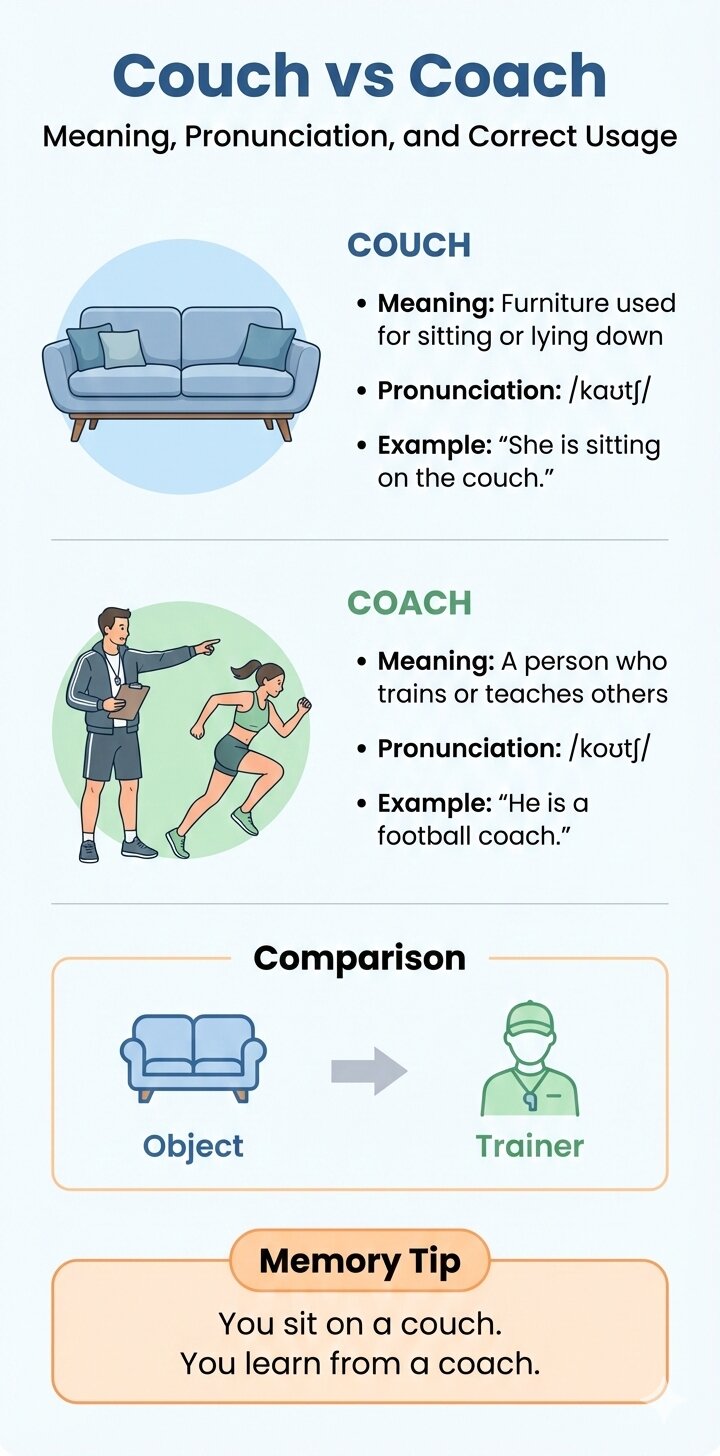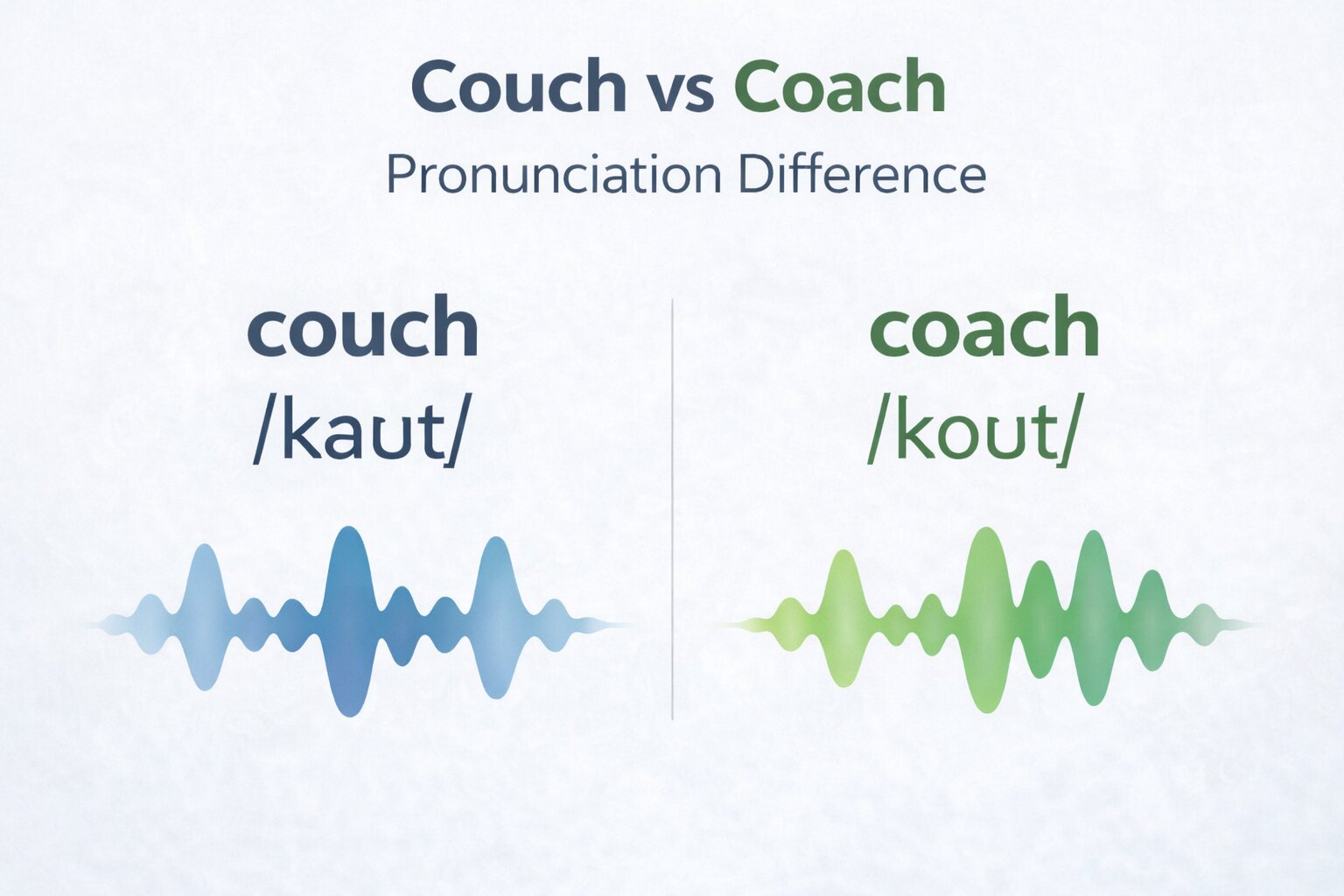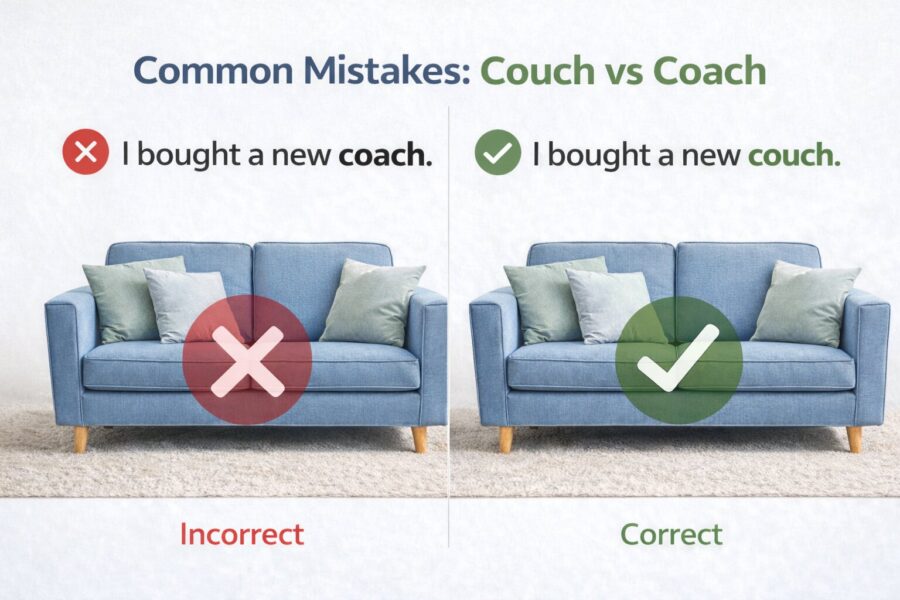Many English learners confuse “couch” and “coach” because they look similar and differ by only one letter. However, they have completely different meanings, pronunciations, and uses.
- Couch refers to a piece of furniture used for sitting or lying down.
- Coach refers to a person who trains others, a type of bus, or a class on transportation.
Understanding the difference is essential for correct communication, especially in professional, academic, and everyday English.
This expert guide will explain everything clearly including meanings, pronunciation, examples, differences, common mistakes, and expert tips.

What Does “Couch” Mean?

Definition
A couch is a piece of upholstered furniture designed for sitting or reclining. It is typically placed in living rooms, offices, lounges, and reception areas.
Simple Definition:
A couch is a long, comfortable seat for two or more people.
Examples:
- I bought a new couch for my living room.
- The office waiting area has a modern leather couch.
- He fell asleep on the couch after work.
Professional Context Examples:
- The lobby features comfortable guest chairs and a matching couch.
- A reception couch improves comfort for visitors.
You might also enjoy: Breathe Vs Breath: Correct Spelling + 2025 Examples
Related Terms:
- Sofa (very similar to couch)
- Loveseat
- Sectional couch
- Lounge seating
What Does “Coach” Mean?

The word coach has multiple meanings depending on context.
Meaning 1: A Person Who Trains Others
This is the most common meaning.
A coach is someone who teaches, trains, or guides others.
Examples:
- She is a leadership coach.
- The football coach trained the team.
- He hired a business coach to improve performance.
Professional contexts:
- Executive coach
- Career coach
- Sales coach
Meaning 2: A Large Bus
A coach can also refer to a long-distance bus.
Examples:
- We traveled by coach from Houston to Dallas.
- The tour company provided a luxury coach.
You might also enjoy: Ladder vs. Latter: What;s the difference + Examples [2025]
Meaning 3: Transportation Class (Flight or Train)
Examples:
- I booked a seat in coach class.
- Coach seating is more affordable than business class.
Couch vs Coach: Direct Comparison Table
| Feature | Couch | Coach |
| Meaning | Furniture for sitting | Trainer, bus, or class |
| Category | Furniture | Person / Vehicle / Service |
| Pronunciation | /kaʊtʃ/ | /koʊtʃ/ |
| Used in office context | Yes (office seating) | Yes (trainer or consultant) |
| Example | Sit on the couch | Talk to your coach |
Pronunciation Difference (Critical for Learners)

Pronunciation is the biggest source of confusion.
Couch Pronunciation:
/kaʊtʃ/
Sounds like: “kowch” (rhymes with “ouch”)
Example:
- couch → /kaʊtʃ/
Coach Pronunciation:
/koʊtʃ/
Sounds like: “kohch” (rhymes with “approach”)
Example:
- coach → /koʊtʃ/
You might also enjoy: When Do You Say Good Evening vs. Good Night?
Visual Meaning Difference (Conceptual)
- Couch → Physical object → Furniture
- Coach → Person or transportation → Trainer or vehicle
Memory Trick:
You sit on a couch, but you learn from a coach.
When to Use Couch in Professional and Office Context
In office environments, couch is used when referring to seating furniture.
Examples:
- Reception couch
- Lounge couch
- Waiting room couch
- Office lounge seating
Example sentence:
- The office reception area includes guest chairs and a modern couch.
This is especially common in:
- Corporate offices
- Executive offices
- Hospitality areas
- Collaborative spaces
When to Use Coach in Professional Context
In business environments, coach refers to someone who improves performance.
Examples:
- Executive coach
- Leadership coach
- Career coach
- Sales coach
Example sentence:
- The company hired a leadership coach to improve management skills.
Common Mistakes and How to Avoid Them

Mistake 1: Using Coach Instead of Couch
Incorrect:
- I bought a new coach for my living room.
Correct:
- I bought a new couch for my living room.
Reason: Coach is not furniture.
Mistake 2: Using Couch Instead of Coach
Incorrect:
- He is my fitness couch.
Correct:
- He is my fitness coach.
Reason: Couch cannot train people.
Mistake 3: Pronunciation Confusion
Learners often pronounce both words the same.
Remember:
- Couch → “ow” sound
- Coach → “oh” sound
You might also enjoy: Suggest Vs Recommend: Usage + Examples + Diffrences
Couch vs Sofa vs Coach: Important Clarification
Many learners also confuse couch and sofa.
| Term | Meaning |
| Couch | Furniture for sitting |
| Sofa | Same as couch (slightly more formal) |
| Coach | Trainer or bus |
Couch and sofa are interchangeable.
Coach is completely different.
Expert Insight: Why This Confusion Happens
This confusion occurs due to:
- Similar spelling
- Similar pronunciation structure
- Same word length
- Common use in spoken English
However, their meanings belong to completely different semantic categories:
- Couch → Object
- Coach → Person or transportation
Understanding semantic category differences helps eliminate confusion permanently.
Real-World Professional Examples
Office Furniture Context:
- The executive lounge includes a leather couch and guest chairs.
- The reception couch enhances visitor comfort.
Training Context:
- The leadership coach helped improve team performance.
- Executive coaching improves management effectiveness.
You might also enjoy: Continually vs. Continuously: Differences + Examples
Quick Summary (Featured Snippet Optimized)
Couch and coach are completely different words.
- Couch = furniture used for sitting or lying down
- Coach = trainer, bus, or transportation class
- Couch pronunciation = /kaʊtʃ/
- Coach pronunciation = /koʊtʃ/
You sit on a couch.
You learn from a coach.
FAQ: Couch vs Coach
1. What is the main difference between couch and coach?
A couch is furniture used for sitting, while a coach is a trainer, bus, or transportation class. They have completely different meanings and uses.
2. Are couch and sofa the same?
Yes. Couch and sofa refer to the same type of furniture. Sofa is slightly more formal, but both are correct.
3. Why do learners confuse couch and coach?
Because they look similar and differ by only one letter, and their pronunciation is also similar. However, their meanings are unrelated.
4. How do you pronounce couch and coach correctly?
- Couch: /kaʊtʃ/ (“kowch”)
- Coach: /koʊtʃ/ (“kohch”)
5. Can coach mean furniture?
No. Coach never means furniture. It only refers to a trainer, bus, or transportation class.
6. Which word is used in office furniture context?
Couch is used when referring to office seating furniture such as reception seating or lounge furniture.
7. What is an executive coach?
An executive coach is a professional who helps managers and executives improve leadership and performance skills.
Final Expert Takeaway
Understanding the difference between couch and coach is simple when you focus on their semantic meaning:
- Couch → Furniture → Physical object
- Coach → Trainer or transportation → Person or service
This distinction is critical for professional English, business communication, and everyday usage.
Mastering these small but important differences significantly improves clarity, professionalism, and language accuracy.

Hi, welcome to my blog! My name is Omid and I am thrilled to have you here! I am an English language teacher with 12 years of experience and hold multiple international certifications (TESOL, IELTS, TOEFL, PTE, CELTA). Additionally, I hold a PhD in Applied Linguistics with a specialization in Teaching English as a Second Language (TESL), which fuels my passion for teaching English and assisting others in mastering the language. To me, nothing is more rewarding than helping individuals enhance their English language abilities through various methods. So, let’s embark on this journey of learning English together.




